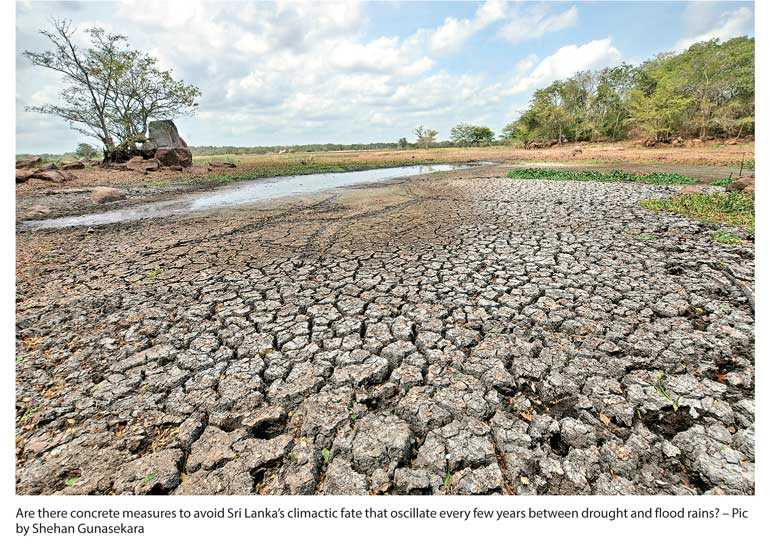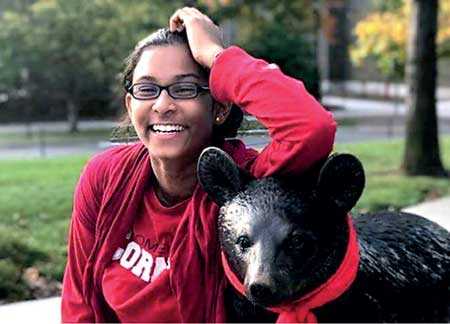Sunday Feb 22, 2026
Sunday Feb 22, 2026
Wednesday, 12 September 2018 00:00 - - {{hitsCtrl.values.hits}}

 By Aisha Rupasingha
By Aisha Rupasingha
“When it comes to the environment, academics talk and nobody listens.” Latent frustration filled Dr. Timotheues Gaasbeek’s voice. He surveyed the room of graduate students before him, then raised a cautionary finger.
“But… people listen over tea.”
The words were a stark detour from the heavily detail-oriented discourse the professor, an expert in International Water Resource Management, had just given on Climate Variability and Water in Sri Lanka. Students and company representatives from various institutions – from University of Kelaniya to Peradeniya to Expolanka – had come to the University of Colombo to listen to him explain the changing climate of the Eastern and Western Provinces due to the impact of rainfall.
However, this had been the turning point of the conversation. He elaborated his point:
“We need to change conversation. I wish every academic had a sixteen-year-old editor—”
The class proffered a laugh.
“—because we need to turn our [conversation] into normal language, we need to become more personal. Get out of our ivory tower… because we’re all actually in the same boat.”
The professor’s unexpected honesty rode on the curtails of a discussion amongst the masterclass attendees that had resulted in many questions. How were we to enact change in Sri Lanka? Was there hope for change? Are there concrete measures to avoid Sri Lanka’s climactic fate that oscillated every few years between drought and flood rains?
Gaasbeek told attendees at the beginning of the class to expect more questions than answers. Yet, his conclusions were revelatory. The recent changes to Sri Lanka’s climate were not the result of an apocalyptic progression to impending disaster due to climate change. While climate change no doubt played some factor of measure, the changes to Sri Lanka’s climate were cyclical. Cooling winds from the currents near Greenland influenced the stability of the rainfall seasons worldwide, bringing a dry period to Sri Lanka every decade or so. There would be good years and bad. During the good years, it was imperative that Sri Lanka enact policy change to bring structural adaptation to the system to avoid the serious repercussions of the bad years.
This would mean creating a buffer during the wet period for the dry period. Diverting resources to areas that would be most affected during droughts. Adjusting cultivation and plantation systems to better prepare for the arrival of the dry season. Maintaining already available reservoirs to provide water sources for farmers and tea cultivators.
But the underlying problem was much more deep-rooted. It would involve changing a mindset to one of awareness and, according to Gaasbeek, that simply was not facilitated by the current nature of discussion. The true deficit was the lack of conversation.
Later during lunch, following the masterclass, Professor Gaasbeek sat down next to me. He was a quiet, reserved man – you could tell in the way he presented his materials that he chose his words carefully. Long pauses of silence filled the space following every sentence he spoke, as if he intended information to sink deep and settle like seeds taking root before proceeding to his next point. This was someone who knew the impact of words, of ideas plainly said versus those dressed up for performance.
“So… what brings you to a masterclass on rainfall?” he asked me. I knew he was asking because during introductions I had been honest about feeling like a fish out of water. I was an American, who barely understood climate in the States, and who had done English as her degree of study in university – a far cry from the many environmentally-focused studies of the other participants. Two seconds before walking into the masterclass, I’d had no concept of the topic of discussion.
I answered honestly. “I’m here for work. I guess I hope to write up something about my experience in the class following this.”
He nodded. We both stared down into our tea cups in silence. Words he had spoken previously swirled in my mind. He had inspired in the class a quiet determination to bring about change, whatever measure that might look like, and given a relatively concrete agenda. However, another moment of impulsive honesty from him had not slipped my notice.
“We’re screwed,” he’d said, following another question. His gaze had been far away. “Or at least our children are. And I don’t know about you, but I’d hope to provide them something better than what they’re going to get.”
He had been speaking about climate change reality as a whole. His words were haunted, existential – they demanded we reflect on the reality of the worldly inheritance we were going to give future generations. It had stuck with me. As an American, I thought of the impact the US had on the rest of the world – on the immense consequences its policies could unintendedly have for a small, but severely important, island far on the other side of the world. I thought of the words of another participant in the masterclass who had huffed in frustration about how Sri Lanka and the rest of the world would have to deal because “one country decided to elect a loony.”
“It’s hard to be optimistic isn’t it?” I asked him then.
Professor Gaasbeek’s laughter was quiet. He let the silence settle again. “Maybe,” he said. “But I believe there exists an alternative to pessimism.”
“What is that?”
“Living life with a sense of irony.”
I laughed out loud. And somehow, miraculously, the pessimistic cloud of thoughts cleared. What was left was the motivating sense of urgency Gaasbeek had inspired during class and an understanding of what conversation outside of the classroom meant. It meant emotional relevance and interconnectedness – the missing link that was the necessary next step in demanding change.
It begged stepping out of academic circles and making the conversation about changing the world climate to one palatable to multiple audiences. Talking about the economy, talking about the tea industry, to those in power in order to instil a desire to act. Bringing an education of climate reality to the large world outside of elite circles and making the issue personal.
It meant embarking on a quest for future solutions equipped with science, conversation, and a healthy dose of irony.
[The ‘Colombo Development Dialogues’ (CDD) is a collaborative initiative by the LSE South Asia Centre (LSE-SAC) and the United Nations Development Programme in Sri Lanka, in partnership with Dilmah Tea, the Citra Social Innovation Lab and the Faculty of Graduate Studies, University of Colombo. The CDD series comprises three components: (1) A Masterclass for research students on the selected thematic area, conducted by an academic brought down by LSE-SAC; (2) The CDD forum; and (3) A post-dialogue Policy Working Paper (currently available for download on the UNDP Sri Lanka and LSE-SAC websites). The forum aims to bring together a diverse group of development thinkers and practitioners to discuss relevant issues pertaining to current national and regional priorities ahead of the 2030 Development Agenda. This article is a reflection of the Masterclass of the second edition of the CDD, which was held on 31 August 2018, in Colombo.]
(Aisha Rupasingha works at the Merrill J. Fernando Foundation in Moratuwa. She is from Washington D.C. in the US and is currently doing a fellowship at The Asia Foundation in Colombo for six months. Her degree is in English from Cornell University, NY and she hopes to pursue a career in children’s entertainment. Aisha has vested interest in learning about climate change, zero waste, and green living.)